Enmeshment: Signs You Might Be Stuck in Unhealthy Family Dynamics
You love your family. You share your wins, your struggles, and even the smallest details of your day. When families are close, it can feel comforting and safe. But sometimes, that closeness can cross an invisible line and slip into something called enmeshment.
In an enmeshed family, the emotional lives of members become so intertwined that there’s little room for individuality. While this may look like love and loyalty on the surface, it often comes at the cost of personal growth, autonomy, and mental well-being.
At Mile High Psychiatry, we see how enmeshment can quietly shape relationships for years, leaving people feeling stuck, guilty, or unsure where their family’s needs end and their own begin.

What Is Enmeshment?
Enmeshment is a relationship dynamic, often within families, where personal boundaries are unclear or nonexistent. Members are overly involved in each other’s lives, to the point where independence is discouraged and individuality can feel threatening.
In an enmeshed family, it’s common for:
- Personal decisions to be influenced or controlled by the group
- Emotional well-being to depend heavily on each other’s moods
- Privacy to be minimal or nonexistent
- Speaking up or setting boundaries to feel disloyal or selfish
While the intention behind this closeness is often love or protection, the result can be stifling. Over time, enmeshment can impact mental health, relationships, and a person’s ability to make independent life choices.

5 Common Signs of Enmeshment
Recognizing enmeshment can be tricky because the dynamics are often normalized within the family. You may not realize there’s a problem until you start to feel trapped, resentful, or anxious about making your own choices.
Here are some signs you might be experiencing enmeshment:
1. You Feel Responsible for Everyone’s Emotions
If a family member is upset, you may feel it’s your job to fix it, and you have to do it immediately. You might also feel guilty for having your own feelings if they differ from the group’s.
2. Your Choices Are Heavily Influenced by the Family
From career decisions to romantic relationships, you may feel you need approval before making a move, or face intense pushback if you act independently.
3. Privacy Feels Wrong or Unattainable
There may be an unspoken expectation to share every detail of your life, and keeping something to yourself can feel like a betrayal.
4. Disagreement Equals Disloyalty
Expressing a different opinion might trigger conflict or guilt, leading you to keep quiet to avoid tension.
5. You Struggle to Define Your Identity Outside the Family
You may feel uncertain about who you are without your family’s input or validation, making it difficult to make independent choices.
The Impact of Enmeshment on Mental Health
Enmeshment can have long-term effects on emotional well-being. It can:
- Increase anxiety from constant responsibility for others’ feelings
- Lead to depression if you feel trapped or unable to live authentically
- Create difficulties in forming healthy adult relationships
- Fuel guilt and shame when trying to establish boundaries
- Limit personal growth by discouraging autonomy and self-discovery
In romantic relationships, people from enmeshed families may either recreate these patterns with their partner or swing to the opposite extreme, avoiding closeness altogether to protect their independence.
Enmeshment vs. Healthy Family Closeness

It’s important to note that not all close families are enmeshed. In healthy family closeness:
- Boundaries are respected and individuality is encouraged
- Family members can disagree without fear of rejection
- Emotional support is offered without controlling behavior
- Privacy is acknowledged as a normal and healthy part of life
The difference between healthy closeness and enmeshment comes down to boundaries. In a healthy dynamic, love and support exist alongside personal autonomy.
Why Enmeshment Happens
Enmeshment often develops over time, usually without malicious intent. Common causes include:
- Overprotection: Parents or caregivers fear harm coming to their children, leading to overinvolvement.
- Family Trauma: Divorce, loss, or financial hardship can cause members to cling to one another for stability.
- Cultural or Generational Norms: In some cultures, family interdependence is valued to the point where independence may be seen as selfish.
- Unresolved Personal Issues: Parents may unconsciously rely on their children to meet their own emotional needs, blurring generational boundaries.
How to Start Breaking Free from Enmeshment
If you recognize yourself in these patterns, change is possible. Here are steps to begin shifting toward healthier boundaries:
1. Identify the Patterns
Notice where you feel obligated to put others’ needs before your own, or where you struggle to make independent choices.
2. Set Small Boundaries
Start with something manageable, like taking private time for yourself without explaining every detail.
3. Practice Tolerating Discomfort
Setting boundaries may bring guilt or conflict at first. Remind yourself that discomfort doesn’t mean you’re doing something wrong; it means you’re breaking a pattern.
4. Focus on Your Own Values and Goals
Ask yourself: If I wasn’t worried about disappointing anyone, what would I choose for myself?
5. Seek Support
A mental health provider can help you explore how enmeshment has shaped your beliefs, develop boundary-setting skills, and manage the emotions that come with change.
How Mile High Psychiatry Can Help
At Mile High Psychiatry, we understand the subtle yet powerful effects of enmeshment. Our compassionate, experienced providers can help you:
- Recognize and understand enmeshed relationship patterns
- Develop healthier boundaries without losing connection
- Manage guilt, anxiety, or fear that surfaces when asserting yourself
- Build confidence in making independent life choices
You Can Be Close Without Losing Yourself
Enmeshment doesn’t have to define your relationships forever. You can care deeply for your family while still honoring your own identity, needs, and goals. Learning to separate your sense of self from others isn’t selfish. It’s essential for healthy, lasting connection.
If you’re ready to explore these dynamics and build healthier boundaries, Mile High Psychiatry is here to help. Contact us today to take the first step toward reclaiming your individuality while keeping the relationships that matter most.


